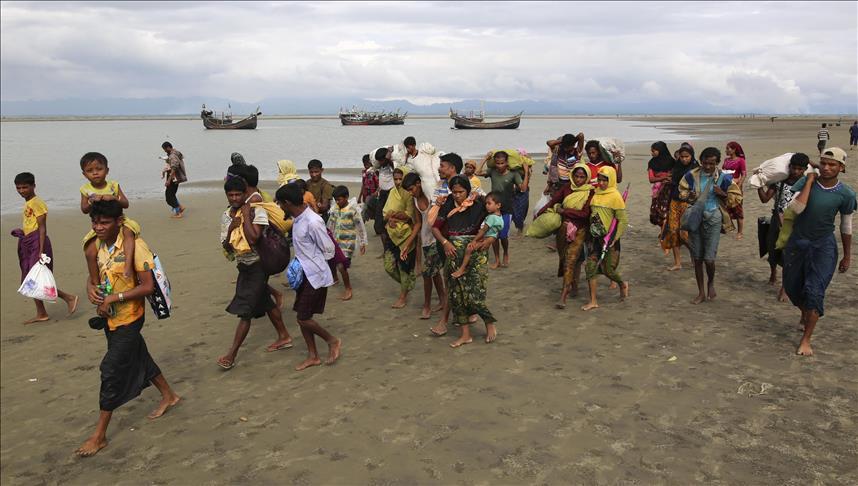Live Makkah
Live Madinah
Urdu Font Download
Latest News:
Padubidri: Fishing boat capsizes; all 7 fishermen on board rescued Alleged atrocity on lawyer: Punjalakatte SI suspended Moral policing at jewellery shop: 4 arrested Bajrang Dal activists try to assault youth, girlfriend in Mangaluru SC to hear Bilkis Bano’s plea against release of 11 convicts on 13 Dec Nusrat Noor: First Muslim Woman to Top Jharkhand Public Service Commission
Latest News:
Padubidri: Fishing boat capsizes; all 7 fishermen on board rescued Alleged atrocity on lawyer: Punjalakatte SI suspended Moral policing at jewellery shop: 4 arrested Bajrang Dal activists try to assault youth, girlfriend in Mangaluru SC to hear Bilkis Bano’s plea against release of 11 convicts on 13 Dec Nusrat Noor: First Muslim Woman to Top Jharkhand Public Service Commission
Rohingya long for an end to their suffering

COX’S BAZAR, 17 Jan 2019 [Fik/News Sources]: Rohingya Muslims, forced to emigrate from their homeland to escape oppression and horrific massacres, cannot escape their painful memories.
Nearly 1.5 million Rohingya Muslims who fled from ethnic and religious persecution in Myanmar and crossed into Bangladesh are struggling to survive in camps in Cox's Bazar district.
Many Rohingya Muslims, some of whom lost family members, are dreaming of a peaceful life despite their pain.
But they do not want to return to their country unless they are given assurances.
One of the refugees, Zafer Islam, whose mother and father were killed by a firing squad, has been living at the Kutupalong camp in Cox’s Bazar since 2017.
"The Myanmar military killed my mother and father as they were leaving their house. We had to run during the attack. I came here with my wife and three children. It is impossible to forget those days, and I am still carrying the scars," Islam said.
Ruhlamin and Anuar Begom, a couple, is also staying in the camp with their two children.
They walked with their children for a week and then swam across the Naf River to reach the camp in Bangladesh, said Anuar Begom, adding they are staying in a house made of bamboo with the support of Turkey.
"Turkey is a country that put up a fight for us and does not forget us here. We understand this from Turkish people's work here," Begom added.
"The first time we came here, we did not have any place to stay, and later people from Turkey came here to build houses for us."
Another refugee, Amir Husein, 55, who reached the camp after a one-week walk with his six children, said: "We came here by walking with a group of 500-600 Rohingya. We're staying at a home built by Turkey."
"I pray for Turkey," he added.
Muhammad Nur, 64, who arrived at the camp with his four daughters and wife after they walked for 12 days, said he lost many members of his family on the migration route to Bangladesh.
The largest amount of help in the camp was given by Turkey. Many facilities were also built, including homes, hospitals, mosques and schools, and many wells were drilled in each neighborhood through contributions from philanthropists.
Life in the camps
Life goes on in the camps despite many difficulties. Some adults are earning 50-100 Bangladesh taka ($0.60-$1.19) daily by working at jobs near the camps. Some refugees are also trading in the camps by selling food products they bring from the city center.
Children, who are studying in schools built by Turkey, on the one hand learn how to read and write and receive religious education while on the other hand spend time together by playing football.
Youngsters in the camp occasionally organize football competitions.
The Rohingya, described by the UN as the world's most persecuted people, have faced heightened fears of attack since dozens were killed in communal violence in 2012.
According to Amnesty International, more than 750,000 Rohingya refugees, mostly women and children, have fled Myanmar and crossed into Bangladesh after Myanmar forces launched a crackdown on the minority Muslim community in August last year.
Since Aug. 25, 2017, nearly 24,000 Rohingya Muslims have been killed by Myanmar’s state forces, according to a report by the Ontario International Development Agency (OIDA).
More than 34,000 Rohingya were also thrown into fires, while over 114,000 others were beaten, said the OIDA report, titled "Forced Migration of Rohingya: The Untold Experience."
Some 18,000 Rohingya women and girls were raped by Myanmar’s army and police and over 115,000 Rohingya homes were burned down and 113,000 others vandalized, it added.
The UN has also documented mass gang rapes, killings -- including of infants and young children -- brutal beatings and disappearances committed by Myanmar state forces.
In a report, UN investigators said such violations may have constituted crimes against humanity.
Prayer Timings
| Fajr | فجر | |
| Dhuhr | الظهر | |
| Asr | أسر | |
| Maghrib | مغرب | |
| Isha | عشا |







